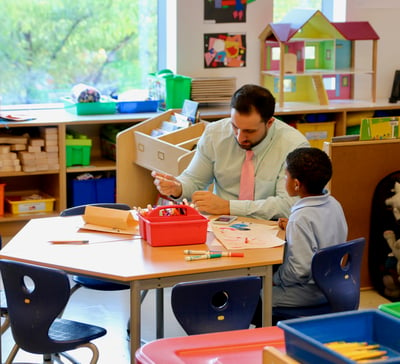CAN WE TALK? TIPS FOR COMMUNICATING WELL WITH KIDS
 {This post was written by Scott Pasieka, Lower School counselor at GEMS World Academy Chicago.}
{This post was written by Scott Pasieka, Lower School counselor at GEMS World Academy Chicago.}
One of the many blessings that come with the responsibility of being a school counselor is being able to hear children's perspectives on life, friendship and endless other important topics. I am consistently amazed by the incredible insight children have on profound ideas, and how equipped they are to cope with the many emotions required to deal with the roller coaster of growing up.
 It seems pretty evident to us as adults that “who we are” can vary from situation to situation. We usually don’t speak to our bosses the way we do our spouses, or to our friends the way we do our parents. We validate this as “social competence.”
It seems pretty evident to us as adults that “who we are” can vary from situation to situation. We usually don’t speak to our bosses the way we do our spouses, or to our friends the way we do our parents. We validate this as “social competence.”
However, we do not always afford children the same luxury. Sometimes, when parents discover that there is a different version of their child out there, they are shocked. The “I know my child!” or “My child tells me everything!” statement comes out as an automatic defense mechanism, an attempt to dispel the inconceivable idea that our children could possibly demonstrate the same social competence that we do when speaking with different people in our lives.
It is important, though, to grant children the freedom to develop social competence. It is also important for parents to establish open lines of communication with their children, so that the children feel comfortable talking about struggles or questions they might be having as their "other" selves.
In this blog post, I hope to provide some tips I have learned via both professional and personal experience that I believe have helped me glimpse the personal thoughts children have swirling in their heads — thoughts that they may be hesitant to share. Before I do, I would like to clarify one very important point. This post is not suggesting that you do not know your child. I am not saying your child has deep and dark secrets. I am simply stating that, like adults, children have some hesitancy to share everything that they think, and that when deciding whether to share something, they will take the audience into account.
Here are some strategies I have used in order to reduce those anxieties and help pave the road for a more clear and honest style of communication between adult and child.
Schedule regular "talk time"
The most important tip I can give you is to first set some time aside to listen to your child. Schedules get busy for both children and adults. If there is a set time during which both parent and child know a talk will occur, then it will be easier to make sure that it happens. Put it in your calendar. Take it seriously and don’t miss it. Use this half-hour or hour to simply listen.
Growing up, my mother did this. Every Sunday, she sat me down for an hour and said: “My job is to listen to you for this hour. You will control what we speak about. If you choose to be silent, we will sit in silence for an hour. But for this hour, we will be together, undistracted, and I will be listening to whatever you want to share.”
This helped me know that no matter how busy our time got, I had an hour to talk about things that mattered to me with her full attention. If she was busy making dinner on a Wednesday and couldn’t give me her full attention, she said: “Write it down on our agenda for Sunday ... I do not want to give it half attention because I know it is important.” This validated me in so many ways and allowed her to continue doing what had to be done while not sacrificing what I felt needed to be spoken about.
By the way, Sunday "talk time" started as something I dreaded. I would sit there in silent protest at first, finally saying: “This is dumb. We are just sitting here.” She responded by “out-patience-ing” me. It didn't take many of these sessions before it all came pouring out. I’d look forward to these talks weekly, and they have continued to this very day. I cannot overstate how important they have been in my development and the development of our relationship.
Appreciate honesty
It's possible that you may hear things you do not like or approve of in these conversations. You may hear your child tell you things that go against your rules or what you have taught your child. This is actually good news. When children feel free to tell you about their struggles or mistakes, it means they trust you. More important than children following parents' rules is their being comfortable enough to talk about times when they didn't. This honesty will help you get to know the person your child is when you are not around.
To bring it back to a personal note, my mom phrased it something like this: “During this hour, I am not your mom. Anything you say or do during this hour, you will not be punished for. This is simply for you to know I am here to hear you and help guide you if you want to be guided. After this hour, you go back to being my son and I go back to being your mother and all of our rules are back on the table. This hour, though, is just two people in a room trying to figure some stuff out.”
This allowed me to tell my mother things my friends didn’t dream of saying to their parents, and it was because she was consistent with her promise. She might offer advice on things, but I was never disciplined for things I shared during that hour. If I was caught doing something wrong outside of that hour, Mom responded appropriately. But that hour was reserved for reflection and conversation in a nonjudgmental way, and I took full advantage. Looking back, I can see the value it gave her, clearly. She got to see what I was thinking and doing when she was not around, and that provided her a very holistic picture of the child she was raising.
Keep setting in mind
The more comfortable one is physically, the more comfortable it will be to have a conversation. It is a good idea to hold these types of conversations in your child’s comfort spaces — a bedroom, the couch in the living room, or wherever you know your child likes to go to relax. Keep the lights low, the television off, and try to limit distractions. Your goal is to create an environment of relaxation, so the only thing the child has to think about is what is being discussed. My childhood conversations with my mother happened in my bedroom with the door closed. During this time my siblings were not allowed in my room, and they were directed to Dad with any concerns. That afforded me physical and mental comfort while assuring me this time would be taken seriously and uninterrupted.
 Listen actively
Listen actively
Children have to listen a lot. Their teachers, parents, coaches, older siblings and pretty much everyone else get to tell them what to do, and for the most part, they must listen. This often leads children to feel as though their voices and opinions are unimportant. A good way to assure they know they are being heard is to let them guide what is being discussed. If you bring a topic up yourself, allow your child to respond first while you hold your comments, and then ask if you can respond. Make them the "adult," so you can listen and learn.
Be sure to maintain eye contact, respond to them nonverbally so they know you’re listening, and keep your phone away.
Be a good conversation model
Your child will respond to how you conduct yourself. Watch your voice level, tone and body language. If you start pointing, yelling, and using sarcasm, expect them to, as well. Consider yourself a mirror — whatever you do, expect to see. Like us adults, children have the ability to read into responses and nonverbal communication. During my talks with my mother, she showed me how to disagree appropriately, how to stay calm when hearing difficult things, and how to share things that are difficult. Kids learn from our actions, and often our actions become theirs.
Talk about neutral issues
I want to stress that not every conversation has to be about emotions, feelings, or relationships. Speaking sometimes about lighter topics, like movies, sports, or any of your child's interests, can help both child and adult get comfortable with the process of talking to one another. This is how my mother kept up-to-date with the things I liked. She told me that knowing the “kid stuff” I liked provided her a nonthreatening opening into what would become a much deeper conversation. Sometimes you need to get the ball rolling with some small talk.
I hope these tips helped. For many of you, this is probably elementary, but I hope they can serve as a good reminder. Giving children a voice and putting aside “what we know about our kids” can help us learn even more about them while assuring that they feel supported. As busy adults, we do not always have to time to immediately attend to the issues children bring up at dinner, in the car, or on the fly. These tips help ensure that your child’s social and emotional needs are given the proper attention while providing you the privilege of learning who your child is becoming on an even deeper level.
Suggested additional reading:
Be available for your children
